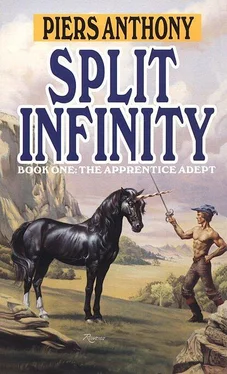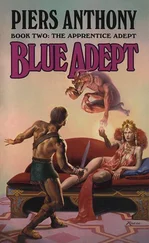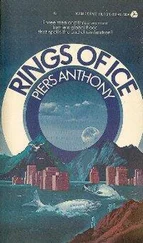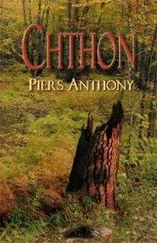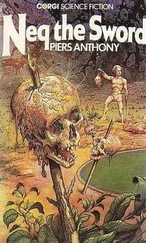Piers Anthony - Split Infinity
Здесь есть возможность читать онлайн «Piers Anthony - Split Infinity» весь текст электронной книги совершенно бесплатно (целиком полную версию без сокращений). В некоторых случаях можно слушать аудио, скачать через торрент в формате fb2 и присутствует краткое содержание. Год выпуска: 2011, Жанр: Фэнтези, на английском языке. Описание произведения, (предисловие) а так же отзывы посетителей доступны на портале библиотеки ЛибКат.
- Название:Split Infinity
- Автор:
- Жанр:
- Год:2011
- ISBN:нет данных
- Рейтинг книги:5 / 5. Голосов: 1
-
Избранное:Добавить в избранное
- Отзывы:
-
Ваша оценка:
- 100
- 1
- 2
- 3
- 4
- 5
Split Infinity: краткое содержание, описание и аннотация
Предлагаем к чтению аннотацию, описание, краткое содержание или предисловие (зависит от того, что написал сам автор книги «Split Infinity»). Если вы не нашли необходимую информацию о книге — напишите в комментариях, мы постараемся отыскать её.
Split Infinity — читать онлайн бесплатно полную книгу (весь текст) целиком
Ниже представлен текст книги, разбитый по страницам. Система сохранения места последней прочитанной страницы, позволяет с удобством читать онлайн бесплатно книгу «Split Infinity», без необходимости каждый раз заново искать на чём Вы остановились. Поставьте закладку, и сможете в любой момент перейти на страницу, на которой закончили чтение.
Интервал:
Закладка:
There was evidently a fair-sized herd in this region. A number of mares, governed by a single powerful stallion? No, there seemed to be several males; he could tell by the positioning of the hoofprints about the in-dentations of urination sites. Males watered in front of the hind hooves; females, behind. But there was bound to be a dominant stallion, for that was the way of horses. Geldings, or cut males, were no more competitive than mares, but potent stallions demanded recognition.
That dominant stallion would probably make the finest steed for Stile’s purpose—but would also be too obvious. Stile needed a good, fast, but inconspicuous animal. A non-herd stallion—probably there were no geldings here, if the animals were actually wild—or a mare. A good mare was in no way inferior; some of the most durable runners were female. Stile had ridden a mare named Thunder once, who brooked no backtalk from any horse, regardless of size or sex, and was herself a magnificent, high-stepping, lofty-headed creature. If he could find a mare like her, here—
He spied the prints of a small horse, no more than fourteen hands, on the verge of being a pony, but supremely healthy. Probably a mare; there was something about the delicacy with which she had placed her feet. Every hoof was sound, and the manure had no infestation. She could run, too—he traced her galloping prints in the turf, noting the spread and precision of the marks, the absence of careless scuffmarks, of signs of tripping. No cracks in these hooves, no sloppy configurations. A good horse, in good condition, could outrun a greyhound, maintaining a velocity of 65 kilometers per hour. This could be that kind of horse. She seemed to be a loner, apart from the herd, drinking and feeding in places separate from the others. That could mean she was more vulnerable to predators, so would have to be more alert, tougher, and swifter. But why was she alone? Horses were basically herd animals.
He followed this trail, by print and manure. At first the piles were old, but as he used his skill to orient they became fresher. It took him some hours to make real progress, for the horse had wandered far—as healthy horses did. As Stile walked, he wondered more persistently: what made this one separate from her companions? Was she, like himself, a private individual who had learned to value alone-rime, or had she been excluded from the herd? What would constitute reason for such exclusion? Obviously she made do quite well alone—but did she really like it?
Stile had quite a lot of empathy for horses, and a lot for outsiders. Already he liked this little mare he had not yet seen. He did not after all need any giant steed to ride; his weight was slight, and he knew how to make it seem lighter. A small horse, even a pony could easily support him. In heroic fantasy the protagonist always bestrode a giant stallion; Stile could handle such a horse, but knew there were points to smallness too. Just as there were points to small people!
Here he was, abruptly, at an aspect of the truth: he was very small for his kind, therefore he liked small things. He identified with them. He knew what it felt like to be looked down on, to be the butt of unfunny jokes. “Hey, dja hear the one about the little moron?” Why did it always have to be a little moron? Why did the terms midget, dwarf, pygmy and runt have pejorative connotation? What the hell was so funny about being small? Since small people were not inferior intellectually, it stood to reason that smallness was a net asset. A better value, pound for pound.
So why didn’t he really believe it? He should not choose a horse because it was small, but because it was the best mount for his purpose. Yet, subjectively—
Stile’s irate chain of thought was interrupted by the sight of his objective. There she stood, as pretty a little mare as he had ever seen. Her coat was glossy black, except for white socks on her hind feet, one rising higher than the other. Her mane fell to the right side, ebony-sleek, and her tail was like the tresses of a beautiful woman. Her hooves glistened like pearl, dainty and perfectly formed. She had a Roman nose, convex rather than straight or concave, but in nice proportion. And her horn was a spiraled marvel of ivory symmetry.
Her what?
Stile actually blinked and rubbed his eyes. He only succeeded in blurring his vision. But what he saw was no trick of the light.
He had found a unicorn.
CHAPTER 7 - Neysa
He must have gasped, for the mare raised her head alertly. She had, of course, been aware of his approach before; horses—unicorns?—had sharp hearing. She had not been alarmed—which itself was remarkable, if she were wild—so had continued grazing. Equines were like that; they startled readily, but not when they thought they had the situation in hand. Evidently this little lady unicorn was much the same.
This was a fantasy world, where magic evidently worked; he had already established that. He still felt the bum on his neck where the amulet-demon’s chain had scraped. So why shouldn’t this world have magic animals too? That made perfect sense. It was only that he had never thought it through, before assuming that these were horses. Was there, actually, much difference between a horse and a unicorn? Some artists represented unicorns with leonine bodies and cloven hooves, but Stile distrusted such conceptions. It could be that a true unicorn was merely a horse with a horn on the forehead. In which case this one would do just fine for him; he could ignore the horn and treat her as a horse.
Stile had not taken time to fashion a lariat; he had been more interested in surveying the situation, and in the memories this experience evoked. Now he decided: this was definitely the animal he wanted. With no rope, he would have to improvise. He doubted she was tame, but she might not be man-shy either.
He walked slowly up to her. The unicorn watched him warily. There was something about the way her horn oriented on him that was disquieting. It was with- out doubt a weapon. It tapered to a sharp point; it was a veritable spear. This was a fighting animal. Scratch one assumption: he could in no way afford to ignore that horn.
“Now my name’s Stile,” he said in a gentle voice. “Stile as in fence. You may not know about that sort of thing, though. I need a—a steed. Because I may have a long way to go, and I can get there faster and better if I ride. I am a very good endurance runner, for a man, but a man does not compare to a good h—unicorn. I would like to ride you. What is your name?”
The unicorn blew a double note through her horn. This startled Stile; he had not realized the horn was hollow. He had been speaking rhetorically, expecting no response. Her note was coincidental, of course; she could hardly be expected to comprehend his words. It was his tone of voice that mattered, and the distraction of it while he approached. Yet that note had sounded almost like a word. “Neysa?” he asked, voicing it as well as he could.
There was a fluted snort of agreement—or so it seemed to him. He reminded himself to be careful how he personified animals; if he ever got to believing he was talking with one on a human basis, he’d have to suspect his own sensibility. He could get himself killed, deluding himself about the reactions of a creature with a weapon like that.
“Well, Neysa, what would you do if I just got on your back and rode you?” He had to keep talking, calming her, until he could get close enough to mount her. Then there would be merry hell for a while: a necessary challenge.
The unicorn whipped her horn about in a menacing manner, and stomped her left forefoot. Her ears flattened back against her head. The language of unicorns was obviously like that of horses, with absolutely clear signals—for those who knew how to interpret them.
Читать дальшеИнтервал:
Закладка:
Похожие книги на «Split Infinity»
Представляем Вашему вниманию похожие книги на «Split Infinity» списком для выбора. Мы отобрали схожую по названию и смыслу литературу в надежде предоставить читателям больше вариантов отыскать новые, интересные, ещё непрочитанные произведения.
Обсуждение, отзывы о книге «Split Infinity» и просто собственные мнения читателей. Оставьте ваши комментарии, напишите, что Вы думаете о произведении, его смысле или главных героях. Укажите что конкретно понравилось, а что нет, и почему Вы так считаете.
